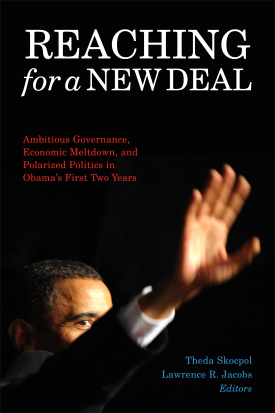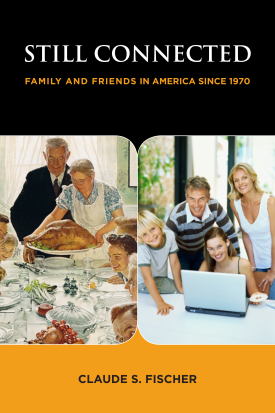
Reaching for a New Deal
About This Book
During his winning presidential campaign, Barack Obama promised to counter rising economic inequality and revitalize America’s middle-class through a series of wide-ranging reforms. His transformational agenda sought to ensure affordable healthcare; reform the nation’s schools and make college more affordable; promote clean and renewable energy; reform labor laws and immigration; and redistribute the tax burden from the middle class to wealthier citizens. The Wall Street crisis and economic downturn that erupted as Obama took office also put U.S. financial regulation on the agenda. By the middle of President Obama’s first term in office, he had succeeded in advancing major reforms by legislative and administrative means. But a sluggish economic recovery from the deep recession of 2009, accompanied by polarized politics and governmental deadlock in Washington, DC, have raised questions about how far Obama’s promised transformations can go. Reaching for a New Deal analyzes both the ambitious domestic policy of Obama’s first two years and the consequent political backlash—up to and including the 2010 midterm elections.
Reaching for a New Deal opens by assessing how the Obama administration overcame intense partisan struggles to achieve legislative victories in three areas—health care reform, federal higher education loans and grants, and financial regulation. Lawrence Jacobs and Theda Skocpol examine the landmark health care bill, signed into law in spring 2010, which extended affordable health benefits to millions of uninsured Americans after nearly 100 years of failed legislative attempts to do so. Suzanne Mettler explains how Obama succeeded in reorienting higher education policy by shifting loan administration from lenders to the federal government and extending generous tax tuition credits. Reaching for a New Deal also examines the domains in which Obama has used administrative action to further reforms in schools and labor law. The book concludes with examinations of three areas—energy, immigration, and taxes—where Obama’s efforts at legislative compromises made little headway.
Reaching for a New Deal combines probing analyses of Obama’s domestic policy achievements with a big picture look at his change-oriented presidency. The book uses struggles over policy changes as a window into the larger dynamics of American politics and situates the current political era in relation to earlier pivotal junctures in U.S. government and public policy. It offers invaluable lessons about unfolding political transformations in the United States.
THEDA SKOCPOL is Victor S. Thomas Professor of Government and Sociology at Harvard University.
LAWRENCE R. JACOBS is the Walter F. and Joan Mondale Chair for Political Studies and Director of the Center for the Study of Politics and Governance in the Hubert H. Humphrey Institute and Department of Political Science at the University of Minnesota.
CONTRIBUTORS: Andrea Louise Campbell, Daniel Carpenter, Judith A. Layzer, Lorraine M. McDonnell, Suzanne Mettler, John D. Skrentny, Dorian T. Warren.
RSF Journal
View Book Series
Sign Up For Our Mailing List
Apply For Funding

Still Connected
About This Book
National news reports periodically proclaim that American life is lonelier than ever, and new books on the subject with titles like Bowling Alone generate considerable anxiety about the declining quality of Americans’ social ties. Still Connected challenges such concerns by asking a simple yet significant question: have Americans’ bonds with family and friends changed since the 1970s, and, if so, how? Noted sociologist Claude Fischer examines long-term trends in family ties and friendships and paints an insightful and ultimately reassuring portrait of Americans’ personal relationships.
Still Connected analyzes forty years of survey research to address whether and how Americans’ personal ties have changed—their involvement with relatives, the number of friends they have and their contacts with those friends, the amount of practical and emotional support they are able to count on, and how emotionally tied they feel to these relationships. The book shows that Americans today have fewer relatives than they did forty years ago and that formal gatherings have declined over the decades—at least partially as a result of later marriages and more women in the work force. Yet neither the overall quantity of personal relationships nor, more importantly, the quality of those relationships has diminished. Americans’ contact with relatives and friends, as well as their feelings of emotional connectedness, has changed relatively little since the 1970s. Although Americans are marrying later and single people feel lonely, few Americans report being socially isolated and the percentage who do has not really increased.
Fischer maintains that this constancy testifies to the value Americans place on family and friends and to their willingness to adapt to changing circumstances in ways that sustain their social connections. For example, children now often have schedules as busy as their parents. Yet today’s parents spend more quality time with their children than parents did forty years ago—although less in the form of organized home activities and more in the form of accompanying them to play dates or sports activities. And those family meals at home that seem to be disappearing? While survey research shows that families dine at home together less often, it also shows that they dine out together more often.
Americans are fascinated by the quality of their relationships with family and friends and whether these bonds fray or remain stable over time. With so many voices heralding the demise of personal relationships, it’s no wonder that confusion on this topic abounds. An engrossing and accessible social history, Still Connected brings a much-needed note of clarity to the discussion. Americans’ personal ties, this book assures us, remain strong.
CLAUDE S. FISCHER is professor of sociology at the University of California, Berkeley.
